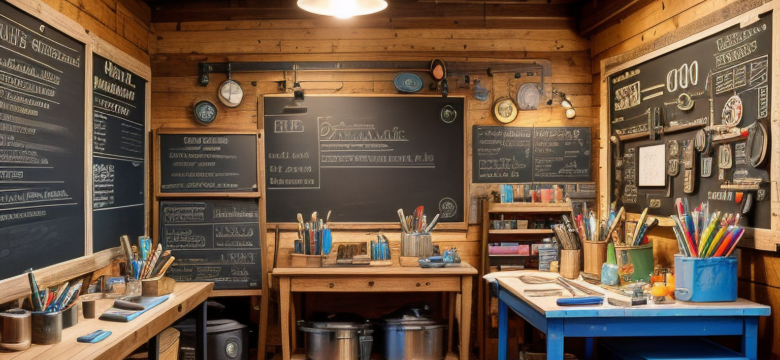Are you ready to elevate your learning experience? Workshops are not just about sitting in a room and listening to a speaker; they can be a transformative experience that sparks creativity and collaboration. Imagine a space where ideas flow freely, and participants feel energised to engage with one another. By exploring innovative workshop concepts, you can create an atmosphere that not only fosters skill development but also ignites passion among attendees. Think of workshops as a canvas – the more vibrant the colours, the more captivating the masterpiece!
In today’s fast-paced world, it’s crucial to stay ahead of the curve. Why settle for ordinary when you can implement extraordinary ideas that challenge conventional learning methods? From interactive activities that keep everyone on their toes to theme-based sessions that resonate deeply, the possibilities are endless. Your workshops can become a hub of dynamic interaction and meaningful connections if you dare to think outside the box. So, are you ready to unleash the full potential of your workshops? Let’s dive into some game-changing ideas that will leave a lasting impact!
Interactive Learning Techniques
Engaging participants through interactive learning methods can significantly enhance retention and understanding. Imagine a workshop where attendees aren’t just passive listeners but active contributors! Techniques such as group discussions, role-playing, and hands-on activities can transform a mundane session into an exhilarating experience. Think of it like a vibrant conversation at a café, where ideas flow freely and everyone has a voice. Why settle for lectures when you can create an environment that buzzes with energy and enthusiasm?
One effective way to encourage interaction is by incorporating real-world scenarios into your workshops. This method allows participants to apply their knowledge in practical situations, making the learning process not only relevant but also exciting. For instance, you could set up a simulated project where teams must collaborate to solve a problem, fostering both teamwork and critical thinking.
Additionally, consider using technology to enhance interactivity. Tools like online polls, interactive quizzes, and virtual breakout rooms can keep participants engaged and provide instant feedback. By blending traditional methods with modern technology, you create a dynamic learning environment that caters to various learning styles.
In conclusion, the key to successful workshops lies in making learning fun and interactive. So, why not shake things up and let creativity reign? After all, the best learning happens when participants are fully engaged!
Theme-Based Workshops
are like a breath of fresh air in the world of learning. Imagine stepping into a room where every detail, from the decor to the activities, revolves around a specific theme. This focused environment not only enhances creativity but also significantly boosts engagement among participants. When a theme resonates with attendees, it sparks their imagination and encourages them to think outside the box.
Choosing the right theme is crucial. It should be relevant and exciting, leading to a more immersive experience. For instance, a workshop themed around “Sustainability” could include activities like creating eco-friendly products or brainstorming solutions for environmental issues. Such themes can transform a mundane session into a vibrant exploration of ideas.
Moreover, a well-structured theme can facilitate collaboration. Participants are more likely to share their thoughts and experiences when they feel connected to the subject matter. This not only enriches the discussion but also fosters a sense of community among attendees. By incorporating elements such as group activities or themed challenges, facilitators can further enhance interaction and teamwork.
In conclusion, embracing theme-based workshops can elevate the learning experience to new heights. They provide a unique opportunity to engage participants, inspire creativity, and cultivate a collaborative spirit that extends beyond the workshop itself.
Incorporating Technology
In today’s fast-paced world, utilising technology in workshops is not just a trend; it’s a necessity! Imagine transforming a traditional learning experience into an interactive, engaging session that captivates every participant. By integrating various technological tools, you can create a dynamic environment where learning flourishes. For instance, platforms like Zoom and Microsoft Teams enable seamless communication, while tools like Miro and Trello foster collaboration and creativity. Have you ever thought about how a simple app could enhance the way you share ideas?
Moreover, technology can facilitate real-time feedback through applications like Poll Everywhere or Slido, allowing participants to express their thoughts instantly. This not only keeps the energy high but also makes everyone feel involved. Think of it as a live pulse check on the workshop’s effectiveness! Additionally, incorporating multimedia presentations using tools like Prezi or Canva can make your content visually appealing and easier to digest.
To help you understand the benefits of incorporating technology, here’s a quick overview:
| Technology | Benefit |
|---|---|
| Zoom | Enhanced communication and accessibility |
| Miro | Facilitates creative collaboration |
| Poll Everywhere | Real-time feedback and engagement |
| Prezi | Dynamic visual presentations |
Incorporating technology not only makes learning more accessible but also prepares participants for a world that increasingly relies on digital solutions. So, why not embrace these tools and watch your workshops transform into a hub of innovation and creativity?
Networking Opportunities
Workshops are not just about learning new skills; they are also fantastic ! Imagine walking into a room filled with like-minded individuals, each with their own unique experiences and insights. It’s like being handed a golden ticket to a treasure trove of connections. But how do you make the most of these moments? First, create an atmosphere that encourages interaction. Icebreakers, group activities, and casual discussions can help participants feel more at ease, paving the way for authentic connections.
Moreover, consider structuring the workshop to include dedicated networking sessions. These can be informal meet-and-greets or structured speed networking rounds, where participants have a set amount of time to introduce themselves and share their interests. This not only breaks the ice but also ensures everyone has a chance to connect. Remember, the goal is to foster meaningful interactions, not just superficial exchanges.
To further enhance networking, provide participants with a contact list or a digital platform where they can share their details and follow up after the event. This way, the conversations can continue beyond the workshop, leading to potential collaborations and partnerships. After all, every great idea often starts with a simple conversation!
Feedback Mechanisms
Feedback mechanisms are the backbone of any successful workshop. They not only provide insights into participant satisfaction but also highlight areas for improvement. Imagine a ship sailing through uncharted waters; without a compass, it may veer off course. Similarly, feedback acts as your guiding star, ensuring you stay aligned with your goals and the needs of your participants.
One effective way to gather feedback is through anonymous surveys. These can be distributed at the end of the workshop, allowing participants to express their thoughts candidly. Consider asking questions such as:
- What did you enjoy most about the workshop?
- Were there any topics that you felt needed more depth?
- How likely are you to recommend this workshop to a friend?
Additionally, incorporating real-time feedback tools during the session can provide immediate insights. Platforms like Mentimeter or Slido allow participants to share their thoughts on the fly, making adjustments possible while the workshop is still in progress. This not only enhances engagement but also fosters a sense of community, as participants feel their voices are heard.
Finally, don’t forget to follow up after the workshop! A simple email thanking participants and inviting further feedback can go a long way. This not only shows you value their opinions but also opens the door for future interactions, keeping the conversation going long after the event has ended.
Measuring Success
When it comes to workshops, is not just a formality; it’s a vital part of understanding the impact you have on participants. Think of it like checking the pulse of your event. Are people engaged? Did they learn something valuable? To answer these questions, you need to employ key performance indicators (KPIs) that provide tangible insights into the workshop’s effectiveness.
Some effective KPIs to consider include:
- Participant Satisfaction: Gather feedback through surveys to gauge overall satisfaction levels.
- Knowledge Retention: Assess what participants have learned through quizzes or practical applications.
- Engagement Levels: Monitor attendance and participation rates during activities.
Additionally, using evaluation techniques such as pre-and post-workshop assessments can help you measure the growth in knowledge and skills. For instance, if a participant scores 60% before the workshop and 85% after, that’s a clear indicator of success!
Ultimately, measuring success isn’t just about numbers; it’s about understanding the transformative experience you provide. By analysing the data, you can refine your approach and ensure that future workshops are even more impactful, making every session a stepping stone towards greater learning.
Follow-Up Strategies
Once your workshop concludes, the journey doesn’t have to end there! Effective follow-up strategies are essential for ensuring that the learning continues and that participants feel supported in applying their newfound skills. Imagine this: you’ve just spent hours engaging with a group, sharing knowledge, and sparking creativity. What if you could keep that momentum going?
To maintain engagement, consider implementing a series of follow-up emails that not only thank participants for their involvement but also provide additional resources and insights related to the workshop topics. This can include links to articles, videos, or even exclusive access to webinars. It’s like giving them a treasure chest of knowledge to explore!
Moreover, creating a dedicated online platform, such as a forum or a social media group, can foster ongoing discussions and connections among participants. This space can serve as a virtual meeting point where ideas are exchanged, questions are answered, and collaborations blossom. Think of it as a garden where your workshop’s seeds of knowledge can grow and flourish.
Lastly, don’t forget to gather feedback! A simple survey can provide invaluable insights into what worked well and what could be improved. This not only enhances future workshops but also shows participants that their opinions matter. After all, who wouldn’t want to feel valued and heard?
Frequently Asked Questions
- What are interactive learning techniques?
Interactive learning techniques involve engaging participants actively in the learning process. This can include group discussions, hands-on activities, and collaborative projects that enhance understanding and retention.
- How do I choose a theme for my workshop?
Choosing a theme for your workshop should resonate with your audience’s interests and goals. Consider their needs and preferences, and select a theme that inspires creativity and encourages participation.
- What technology tools can I incorporate into my workshop?
There are many tools available, such as video conferencing platforms, interactive presentation software, and collaboration apps. These can enhance engagement and make learning more accessible for participants.
- How can I facilitate networking during workshops?
To foster networking, create structured activities that encourage participants to interact, such as icebreakers or group projects. Providing breaks and informal settings can also help build connections.
- Why is feedback important after a workshop?
Feedback is crucial for continuous improvement. It helps you understand what worked well and what could be enhanced, ensuring future workshops meet participant needs and expectations.
- What are key performance indicators for measuring success?
Key performance indicators can include participant satisfaction rates, engagement levels during sessions, and the application of skills learned. These metrics help evaluate the workshop’s overall impact.
- How can I maintain engagement after the workshop?
Follow-up strategies such as sending additional resources, hosting Q&A sessions, or creating online communities can help keep participants engaged and support them in applying their new skills.





